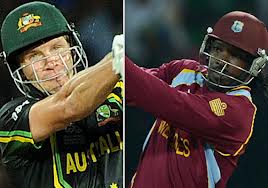
Colombo, October 4: A determined Australian outfit will be aiming to eliminate the 'Chris Gayle factor' when they meet a rejuvenated West Indies in the semi-final of the ICC World Twenty20 here tomorrow.
For Australia, it will be a chance to get into the final for the second time in succession after the 2010 edition and once again stamp their class as world's premier cricketing outfit.
For West Indies, it's more about the identity and trying to fight the inner demons which have affected their cricket since late 80's. A berth in the final of a global event can be a big boost for the Caribbean nation where basketball, athletics and soccer have captured the imagination of the masses.
Therefore, it's redemption time for both the teams although their circumstances are entirely different. Behind every 'Big Battle', there's always a mini-battle that spices up a marquee contest.
Tomorrow when the two teams lock horns, it will also be a battle between Shane Watson and Chris Gayle. If Watson, who has won four man-of-the-match awards in five matches will play a key role in Australian set-up, Gayle can change the complexion of the match at any point of time with his ferocious power-hitting.
By sheer statistics, Watson is miles ahead of Gayle having scored 242 runs in five matches along with 11 wickets which makes him the favourite to win the 'Player of the Tournament' award.
However, Gayle who has so far hit 10 sixes in five matches, has scored two 50's and on his day can tear apart any bowling attack in the world. The law of averages did catch up with Watson in the last match against Pakistan but that means that he will be hungrier than ever to take Aussies to the summit clash.
While Gayle and Watson will hold fort as the main protagonists for their respective sides, there will still be a few competent cricketers who will try to play the supporting roles to the best of their abilities.
Marlon Samuels has beautifully complemented Gayle. He might not look as destructive as Gayle from the onset but once set, can be as devastating as anybody. For Australia, the main supporting role has been played by Mike Hussey whose responsible innings ensured smooth passage into the semi-finals.
Hussey has been a perfect foil which has enabled Watson to express himself. David Warner has had his moments but his presence has largely been subdued. There are some obvious weak-links in both sides.
Australia's main problem is lack of match time for their middle-order batsmen. The only time their middle-order got chance to showcase batting prowess, it failed miserably.
It's certainly time that their skipper George Bailey leads from the front and earns respect for his team's superb show in the tournament. Similarly, the West Indian team's pace attack is a little inferior in quality compared to Australia.
Fidel Edwards has the pace and Ravi Rampaul can be skiddy but Watson has more variations up his sleeve while Mitchell Starc has always been incisive in his first spells.
Squads:
Australia: George Bailey (c), Dan Christian, Pat Cummins, Xavier Doherty, Ben Hilfenhaus, Brad Hogg, David Hussey, Michael Hussey, Glenn Maxwell, Clint McKay, Mitchell Starc, Matthew Wade, David Warner, Shane Watson, Cameron White.
West Indies: Darren Sammy (captain), Dwayne Bravo (vice captain), Samuel Badree, Darren Bravo, Johnson Charles, Fidel Edwards, Chris Gayle, Kieron Pollard, Sunil Narine, Denesh Ramdin, Ravi Rampaul, Andre Russell, Marlon Samuels, Lendl Simmons, Dwayne Smith.





Comments
Add new comment